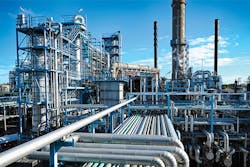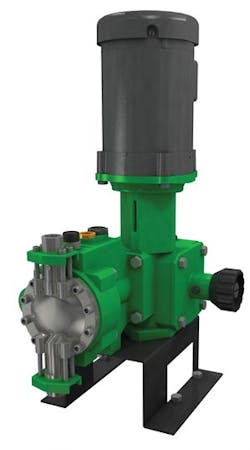Chemical plants benefit from a mix of chemical metering pumps
Chemical manufacturing is tied to the general economy because plastics, polymers, adhesives and other chemical-based products are pervasive in every industry. As the macroeconomy picks up, the chemical industry follows suit, and with this growth comes an increased demand for water use.
Chemical companies are among the biggest water users on the planet, investing billions each year in water acquisition, treatment and disposal. They require almost 3 pounds of water for every pound of chemical produced, and more than 70 percent of this water must be cleaned and treated before it can be discharged, after being used only once. Properly managing water and wastewater treatment can produce savings of 1 to 2 percent annually, which, for companies like DowDuPont or BASF, can add up to millions of dollars each year.
The pumping infrastructure used to treat water is a good place to find efficiencies, since the largest chemical producers deploy thousands of pumps in each facility. While many of these pumps are transfer pumps, an examination of the chemical metering pumps used to make products and treat process water reveals opportunities to save costs. The four most common chemical metering pump applications in chemical manufacturing plants include:
- Dosing precise volumes of chemicals to make products
- Pretreating the process water to boost quality and efficiency
- Dosing antiscaling chemicals to clean and protect plant infrastructure
- Post-treatment of the wastewater prior to disposal
Chemical metering pumps
Each of these applications can be addressed by reciprocating pumps, which work by using a piston or a diaphragm to dose a precise volume of fluid with each stroke. Reciprocating pumps are highly engineered to provide extreme accuracy at high pressures and relatively low flows.
Rotary gear pumps provide a cost-effective alternative for some applications. They work by moving fluid in a circular fashion between gears. Rotary pumps pick up fluid at the suction port between the gear teeth, and they carry the fluid around the outer diameter of the gears to the discharge port. Rotary pumps are best utilized in high-volume, low-pressure applications, and their flow rates can be controlled with variable speed drives.
Each pump type has advantages, and they both come at different price points. By incorporating the right mix of chemical metering pumps, DowDuPont, BASF and other chemical companies have been able to save money without compromising on performance.
Chemical manufacturing
Of the thousands of products manufactured by large chemical companies, polyethylene (plastic) is one of the most common. More than 80 million tons are manufactured each year for products ranging from bottles and buckets to packaging and hundreds of other products that are seen and touched each day.
Plastics are made by breaking down crude oil and natural gas feedstocks into smaller hydrocarbon molecules through a complex cracking process and a mixture of chemical additives. Specific volumes of different chemicals must be dosed under the right pressures at certain temperatures and at precisely the right time to transform the feedstocks into plastics. The pumps used to dose these ingredients must be highly accurate. They should also be modular and customizable to accept a variety of liquid ends (stainless, alloy or PVC) to meet different process requirements. Pumps should also have different frame sizes to address a wide range of capacities and pressures. For these reasons, reciprocating metering pumps are the preferred choice for this application.
Pretreating process water
There is a direct correlation between the quality of the process water and the efficiency of the plant (and the resulting quality of the product manufactured). Most chemical plants are located on a river or other body of water. The quality of the incoming water can vary by storms or man-made interactions. It should be cleaned to remove organic impurities and manage microbio organisms and foulants from hindering efficiency and damaging the plant’s pumping infrastructure.
Pretreatment applications typically involve pH adjustment, which is accomplished by administering specific volumes of acids to alkaline feedwater (pH higher than 7) to lower the pH, while similar volumes of caustics are dosed to acidic feedwater (pH lower than 7) to raise its alkalinity. Although pH balancing in chemical plants is not as stringent as applications in municipal plants, the timing of the treatment is uncompromising. Chemical plants run continuous operations, and they cannot function without abundant supplies of treated water. So, the pumps used must be highly reliable and able to run on a continuous basis.
Additional pretreatment applications include dosing chemicals in a flocculation basin to aggregate precipitated particles, making them easier to filter out. After this treatment, the coagulated particles are separated from the water and removed from the process.
Both pretreatment applications can be adequately accomplished by rotary gear pumps, which are less expensive than reciprocating pumps and easier to maintain. Rotary pumps feature fewer parts and are designed to operate continuously for long periods of time without requiring adjustments or maintenance.
Rotary pumps feature fewer parts [than reciprocating pumps] and are designed to operate continuously for long periods of time without requiring adjustments or maintenance.
Cleaning & protecting plant infrastructure
Water’s life-giving properties encourage bacterial growth, which can foul system surfaces. Water also dissolves gases (such as oxygen and carbon dioxide), which can corrode metals. If left untreated, scale deposits and fouling can diminish the plant’s efficiency and could lead to unplanned downtime. To protect plant equipment, precise doses of sulfuric acid, phosphate and other scale inhibitors must be added to cooling towers and throughout the plant to mitigate scaling and to prevent fouling.
These chemicals are toxic in nature, and they are expensive. Accurate dosage is required to administer enough of the chemicals to protect plant equipment, while also ensuring that they are not wasted or excessively dosed. For these reasons, reciprocating pumps are the preferred choice.
Figure 2. Reciprocating pumps are engineered for extreme accuracy, and they are well-suited for high-pressure applications.
Treating wastewater prior to disposal
About 70 percent of the water used in a chemical plant will be discarded after it is used just once. When a given process is finished, water can become toxic, so it must be treated and neutralized before it can be properly disposed. These processes include disinfection, dechlorinating, denitrification and odor/color control. The alkalinity of the process water must be restored by injecting harsh chemicals such as sulfuric or hydrochloric acids to correct pH levels. Disinfectants such as chlorine or sodium hypochlorite are also used to improve odor and eliminate unwanted microorganisms.
For these wastewater treatment applications, either reciprocating or rotary gear pumps can be used; however, in many instances, rotary pumps can deliver the required results more economically.
Additional benefits with the right mix of chemical metering pumps
Increased uptime
Plant uptime is one of the most important economic measurements for companies like DowDuPont and BASF that operate many plants 24 hours a day, 365 days a year, even during holidays. Using metering pumps that are easy to maintain gives plant operators the flexibility needed to schedule maintenance at the most opportunistic time. Maintenance costs must be measured beyond the expense of the parts, tools and engineers who wield them. These costs must include any unscheduled downtime, which has a direct effect on the bottom line.
Simplified maintenance
Rotary pumps offer an advantage with respect to maintenance due to the simplicity of their design. If a pump’s gears are not readily accessible, then engineers need to decouple the motor, close the valves, and remove piping at the suction and discharge ports of the pump. But rotary pumps with a front pullout design can be repaired in place. This minimizes downtime by eliminating the need to lock out or tag out the pump and move it to the repair shop (in some plants, this would need to be done by a separate union employee).
Safety
Exposure to the chemicals used to treat wastewater, such as chlorine gas, can cause respiratory issues for employees, so great care should be taken to ensure that leaks do not occur when dosing hazardous chemicals. Rotary gear pumps are sealless, with no leak points for harsh chemicals to damage the pump or the surrounding equipment. By using sealless rotary pumps for pre- and post-treatment applications, chemical plants can ensure a higher level of safety for plant employees.
Accuracy & precision
Although many of the water and wastewater treatment applications in chemical plants can be accomplished by either type of pump, the metering/dosing of chemical ingredients needed to make products (such as plastics, polymers and adhesives) requires precise accuracy that can only be delivered by reciprocating diaphragm pumps. These pumps should have turndown capabilities of 1,000 to 1, with steady-state accuracy. They must be available with different liquid end materials to accommodate a wide range of harsh chemicals, and they must be able to address a wide range of flow volumes.
Reduced footprint
Some of the larger chemical plants in the U.S. feature thousands of pumps, and plant operators express a desire to reduce the footprint for many of these pumps. Smaller pumps free up space on the shop floor, and ergonomically designed pumps are easier to work on.
Rotary pumps are compact in nature. And new Polytetrafluoroethylene (PTFE) diaphragms featured in some of today’s latest reciprocating pumps have resulted in smaller, lighter and less expensive pumps that can still deliver the flow volumes and pressures once associated with much larger, more expensive pumps.
Conclusion
The advantages of rotary gear pumps in metering applications include: initial lower costs, minimal maintenance (via the simplicity of the system), and the need to stock smaller parts inventories. The advantage of reciprocating pumps includes precision, which, for some applications, is nonnegotiable.
To determine the proper mix of reciprocating and rotary pumps for chemical plants, operators should consider factors such as initial cost, pump capabilities, performance, reliability and maintenance costs over the life of the pump. They should be mindful to strike a balance between efficiency and effectiveness, and they should seek out distributors that carry both types of pumps, readily available parts and the expertise to service each type of pump.
Pat Miller is Pulsafeeder’s director of commercial, project and application engineering. He has worked at Pulsafeeder for 28 years, and he brings an extensive background in engineering and drafting to Pulsafeeder’s partners and customers. Miller can be reached at [email protected]. For information on Pulsafeeder rotary and reciprocating pumps, visit http://pulsa.com.


